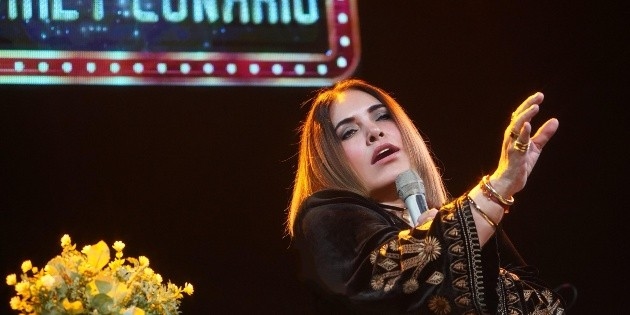Juan del Val, Planeta Prize winner: "If I criticize Pedro Sánchez, I'm a terrible fascist, and when I criticize Ayuso, I'm a dangerous red."
Beyond his television work, the journalist asserts his talent as a writer, reinforced after receiving the highest literature award for 'Vera. A Love Story.' "I avoid elitist posturing and champion provocation and connection with the audience," he argues in Barcelona.
Exactly three years ago, Juan del Val attended the Planeta Prize ceremony, won by Luz Gabás, as just another guest. "There are always pools to guess who will win the Planeta Prize this year, and one name always comes up and keeps getting tossed around all day long, but in reality, it's some loser who everyone thinks is going to win, and of course, doesn't. This year it was me," he said the next day on La Roca, the program hosted by his wife, Nuria Roca , on La Sexta, where he regularly collaborates. Last night, his name was mentioned again in the Planeta Prize pools (even Máximo Huerta 's). But this time, it was him: the winner of one million euros for Vera. A Love Story , the manuscript that prevailed over more than 1,300 others, in another year that set a new record for participation.
- Last night, when you collected the award, the first thing you said was that it was "almost a miracle"... Why?
- The award represents something extraordinary, something that seems reserved only for others. I've attended many Planeta Prize galas, and although one harbors the secret desire that one day it will be theirs, they never quite believe it. When it happened, I perceived it as a miracle: an unexpected, yet deeply desired event. In my brief speech, I wanted to convey that pent-up emotion.
- You also mentioned that there were times in your life when you seemed "destined for personal failure." You also mentioned dust, cement, mud... from your time working in construction. How did that period influence your life and your writing?
- I frequently draw on the experiences of a teenager who suffered, as those firsthand experiences become a valuable resource for conveying them to the characters. There was a period in my life, not too long, when I felt excluded from everything and didn't have a good time. Remembering that young man seemed appropriate in the discourse, as it connects with resilience and the experiences that nourish literary creation.
- It seems to refer to Antonio, the humble young man with whom Vera, a high-society woman, falls in love in your novel... Does it explore a dimension of class difference?
- The novel exposes realities, but I write without dogmatic pretensions or pontificating; I leave the reader's interpretation free. There is an obvious difference between Sevillian high society, with its marquises, and a boy from a Madrid neighborhood, which highlights disparities in social class and opportunity. However, this is not an explicit social critique: I simply describe different worlds without judgment. I reject simplistic stereotypes like "bad rich people and good poor people," as there are exceptional and detestable people in all strata. My novels focus on contemporary characters living in recognizable environments; I never judge the characters, whether in fiction or in real life. The reader decides whether they like them or not.
- He also claimed literature as a "popular event," not reserved for certain supposed "intellectual elites."
- There's a misunderstanding that associates commercialism with a lack of quality, which I respect but deeply disagree with. The Planeta Prize is based on two pillars: commercialism and literary quality. Works like Don Quixote and Frankenstein were commercial in their time and are classics today. Writing is an intimate act, but with the aim of reaching the widest possible audience; literature should be a vehicle for accessible artistic communication.
- In the Anglo-Saxon world, commercialism doesn't generate as much suspicion. Stephen King is commercial, of course. And his literary quality is undeniable. Do you think this suspicion is something that occurs especially in Spain?
- Yes, it's a very local and recent phenomenon. In the 1980s, writers like Antonio Gala and Camilo José Cela were popular figures on television without questioning their seriousness. And what about Terenci Moix on his TV shows? Today, if a writer appears in the media, they're not taken seriously. It seems that to be one, you have to put on a very serious and sinister face. I shy away from those elitist poses and champion provocation and connection with the audience.
- When a writer who appears on television wins the Planeta Award or is a finalist, like Sonsoles Onega or Sandra Barneda in recent years, criticism on social media and in the media is exaggerated the day after the gala. There are a few about you today... How do you handle it? And why do you think there is this "suspicion" toward television professionals?
- These reactions speak for themselves: the day after the gala, no one has read the novel, so any criticism is premature; no one has been able to judge it. I accept criticism. I'm very used to it [he smiles ironically and confidently].
- Sometimes it seems that he even enhances them, that he likes being controversial...
- I believe that creators, writers, artists, and so on should adopt a provocative perspective on society. Those who never upset anyone don't seem interesting to me. I put extreme opinions into perspective: I don't believe either the excessive praise or the demons and merciless criticism. I've been called everything from conservative to sexist, even though all my protagonists are strong, self-possessed women, without Prince Charmings to save them. Men, in general, come off poorly for me. In this novel, he's the first man I've done halfway well. Writing female characters is my trademark. Should we label her a feminist? Whatever you want, but it certainly seems that way to me. Anyone who calls me sexist doesn't know me or has read my biography or my books.
- He entered the literary world with his wife, Nuria Roca, co-authoring two books. How did this collaboration influence his career as a solo writer?
- I've been an entertainment screenwriter for years, with an audiovisual background that informs my narrative, cinematic, and visual style. Collaborating with Nuria came naturally; we wrote together because it worked, but then our paths diverged due to creative incompatibilities. My first solo novel, Parece mentira , was autobiographical and had limited initial impact. The Primavera Prize with Candela in 2019 marked a turning point, giving me visibility as a writer beyond being "Nuria Roca's husband." It was followed by Delparaíso, my most literary work and a bestseller, and Bocabesada . This Planeta Prize is an opportunity to establish myself as an independent author, with literary ambition and hope for greater sales. Because I have a lot of literary ambition.
- In his speech at the Planeta, he couldn't help but make a dig at politicians. He claimed that all writers live off the people and reminded politicians that they do too. In the current climate, do you feel the government is marginalizing creators or intellectuals who don't align with its ideology?
- I don't know. I know how I'm doing and the sympathies or antipathies I can arouse in this government. But I'm also very clear about one thing. As I said, I put things into perspective and I like to see things in perspective. I know I'm very critical of this government because I think so and because I believe we must be critical of those in power. When others govern, I'll be too. I go from being a dangerous red to a tremendous fascist from one place to another, even in the same talk show. If I criticize Pedro Sánchez, I'm a terrible fascist, and when I criticize Ayuso, I'm a red. The point they have in common is that they both rule, and it seems to me that's the people you truly have to dare to speak to. Do you sometimes find it expensive? Yes. But I also tell you, and I don't mean to sound arrogant about this, I don't care at all.
- Has being critical of power cost you dearly personally?
- There are times... I'm doing very well now. But there have been times when you see a campaign completely directed against you, using something you haven't even said to build an image, for example, of being a fascist or a sexist. And you see how they construct it in such a perverse way... In the end, it sinks in. And it seems a little unfair. But I think with time, everything falls into place, everything prevails. Ideologically, you can sense me in a place, but if I'm not really there, it eventually shows.
elmundo





